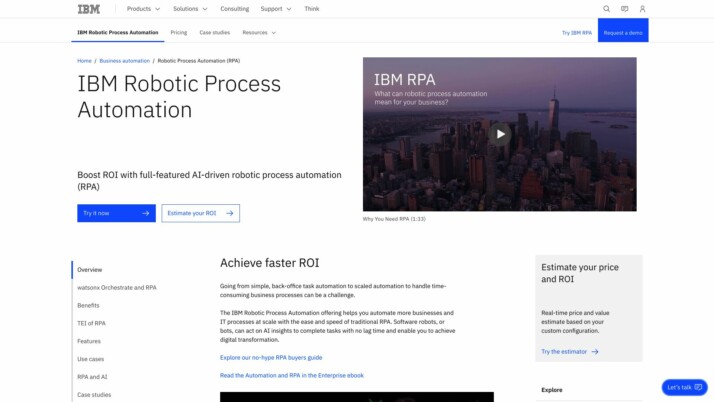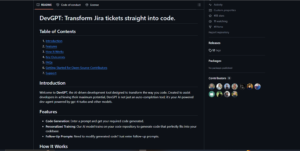IBM RPA vs. DevGPT: AI Automation Showdown
AI-powered automation tools reshape how businesses operate and developers create software. IBM RPA vs. DevGPT exemplify two distinct approaches to this technological revolution. IBM RPA offers enterprise-grade process automation, while DevGPT focuses on AI-assisted code generation for developers.
This comparison explores their unique features, strengths, and limitations to help you determine which solution best fits your needs. We’ll also introduce SmythOS, a versatile platform that combines the best of both worlds, offering unparalleled flexibility and integration capabilities for businesses of all sizes.
IBM RPA Overview
IBM RPA empowers businesses to automate repetitive tasks and streamline workflows across enterprise applications. This robust platform combines artificial intelligence with robotic process automation to create intelligent software bots capable of mimicking human interactions with digital systems.


The core offering revolves around a low-code authoring environment where users can build, deploy, and manage bots for both attended and unattended automation scenarios. IBM RPA shines in its ability to integrate with legacy systems, APIs, and modern cloud applications, making it a versatile solution for organizations with complex IT landscapes.
IBM RPA shines in its ability to integrate with legacy systems, APIs, and modern cloud applications, making it a versatile solution for organizations with complex IT landscapes.
Key features of IBM RPA include visual bot builders, AI-powered decision-making capabilities through watsonx Orchestrate integration, and robust security measures. The platform excels in enterprise-grade scalability, allowing businesses to deploy hundreds or thousands of bots concurrently. This scalability, combined with centralized management tools, positions IBM RPA as a strong contender for large-scale automation initiatives.
While IBM RPA offers comprehensive functionality, its enterprise focus may present a steeper learning curve for small businesses or individual users. The platform’s strength lies in tackling complex, high-volume processes rather than simple, one-off automations. As with many enterprise solutions, pricing can be a consideration for smaller organizations.
IBM RPA integrates seamlessly with other IBM offerings and third-party tools, enhancing its utility within existing technology stacks. The platform’s ability to work with various data types and interact with multiple systems simultaneously makes it well-suited for organizations looking to implement end-to-end process automation across departments.
DevGPT Overview
DevGPT transforms natural language prompts into executable code, streamlining software development workflows. This open-source AI assistant integrates with GitHub and Jira to automate pull requests from tasks and tickets, leveraging advanced models like GPT-4 and Codex.


DevGPT’s personalized training adapts to individual coding styles, learning from users’ codebases to generate contextually relevant snippets. Developers can fine-tune outputs through editable code and feedback comments, enhancing the AI’s understanding of specific project requirements.
DevGPT’s personalized training adapts to individual coding styles, learning from users’ codebases to generate contextually relevant snippets.
Productivity gains stand out as a key benefit, with initial users reporting over 10 hours saved weekly on repetitive coding tasks. This time-saving feature allows developers to focus on complex problem-solving and creative aspects of software engineering.
Productivity gains stand out as a key benefit, with initial users reporting over 10 hours saved weekly on repetitive coding tasks.
While DevGPT shows promise for individual developers and small teams, its scalability for larger enterprises remains unclear. The platform’s current focus on serving smaller groups may limit its applicability in expansive corporate environments requiring robust security and compliance features.
DevGPT’s vision aims to position the tool as an essential AI coding companion across all company sizes. However, achieving this goal will require expanding its feature set to address enterprise-level concerns such as team collaboration tools, advanced security measures, and seamless integration with a wider array of development ecosystems.
Feature Comparison
IBM RPA and DevGPT offer contrasting approaches to automation and AI-assisted development. IBM RPA provides enterprise-grade robotic process automation with AI capabilities, while DevGPT focuses on AI-powered code generation for developers.
IBM RPA excels in security and compliance features critical for large organizations. It offers robust data encryption, OAuth integration, and IP control absent from DevGPT’s open-source model. IBM RPA also provides extensive logging and monitoring tools for governance and analytics, surpassing DevGPT’s capabilities in this area.
DevGPT shines in its developer-centric approach, with personalized code generation adapting to individual coding styles. This feature is notably absent from IBM RPA’s more generalized automation tools. DevGPT’s integration with developer platforms like GitHub and Jira streamlines the coding workflow in ways IBM RPA does not address.
While both platforms leverage AI, their core components differ significantly. IBM RPA focuses on creating autonomous bots for business process automation, incorporating AI for decision-making. DevGPT, conversely, uses AI primarily for code generation and developer assistance, lacking the broad process automation features of IBM RPA.
These differences highlight the distinct target audiences and use cases for each platform. IBM RPA caters to enterprises seeking comprehensive automation solutions, while DevGPT serves individual developers and small teams looking to enhance their coding productivity.
Feature Comparison Table
| IBM RPA | DevGPT | SmythOS | |
|---|---|---|---|
| CORE FEATURES | |||
| AI Agents | ❌ | ✅ | ✅ |
| Hosted Agents (Dev, Production) | ✅ | ❌ | ✅ |
| Environments (Dev, Production) | ✅ | ❌ | ✅ |
| Visual Builder | ✅ | ❌ | ✅ |
| No-Code Options | ✅ | ❌ | ✅ |
| Memory & Context | ❌ | ✅ | ✅ |
| Autonomous Agents | ❌ | ❌ | ✅ |
| Explainability & Transparency | ❌ | ❌ | ✅ |
| Multimodal | ❌ | ❌ | ✅ |
| Problem-Solving Capabilities | ❌ | ✅ | ✅ |
| Multi-Agent Collaboration | ❌ | ❌ | ✅ |
| Audit Logs for Analytics | ✅ | ❌ | ✅ |
| Work as Team | ❌ | ✅ | ✅ |
| Bulk Work | ✅ | ❌ | ✅ |
| Agent Work Scheduler | ✅ | ❌ | ✅ |
| Logs & Monitoring | ✅ | ❌ | ✅ |
| SECURITY | |||
| Constrained Alignment | ❌ | ❌ | ✅ |
| Data Encryption | ✅ | ❌ | ✅ |
| OAuth | ❌ | ❌ | ✅ |
| IP Control | ❌ | ❌ | ✅ |
| COMPONENTS | |||
| Foundation AIs | ❌ | ❌ | ✅ |
| Huggingface AIs | ❌ | ❌ | ✅ |
| Zapier APIs | ❌ | ❌ | ✅ |
| All other APIs, RPA | ✅ | ❌ | ✅ |
| Classifiers | ❌ | ❌ | ✅ |
| Logic | ✅ | ❌ | ✅ |
| Data Lakes | ❌ | ❌ | ✅ |
| DEPLOYMENT OPTIONS (EMBODIMENTS) | |||
| Deploy as API | ✅ | ❌ | ✅ |
| Deploy as Webhook | ❌ | ❌ | ✅ |
| Staging Domains | ❌ | ❌ | ✅ |
| Production Domains | ❌ | ❌ | ✅ |
| API Authentication (OAuth + Key) | ❌ | ❌ | ✅ |
| Deploy as Site Chat | ❌ | ❌ | ✅ |
| Deploy as Scheduled Agent | ✅ | ❌ | ✅ |
| Deploy as GPT | ❌ | ❌ | ✅ |
| Scalability | ✅ | ❌ | ✅ |
| DATA LAKE SUPPORT | |||
| Hosted Vector Database | ❌ | ❌ | ✅ |
| Sitemap Crawler | ❌ | ❌ | ✅ |
| YouTube Transcript Crawler | ❌ | ❌ | ✅ |
| URL Crawler | ❌ | ❌ | ✅ |
| PDF Support | ✅ | ❌ | ✅ |
| Word File Support | ✅ | ❌ | ✅ |
Best Alternative to IBM RPA and DevGPT
SmythOS stands out as the superior alternative to IBM RPA and DevGPT, offering a comprehensive AI automation platform that combines the best of both worlds. Our platform empowers users with a versatile set of tools for creating and deploying AI agents quickly and efficiently.
Unlike IBM RPA’s focus on robotic process automation or DevGPT’s narrow emphasis on code generation, SmythOS provides a holistic solution for AI-driven automation across various use cases. We offer a user-friendly drag-and-drop interface that simplifies the creation of complex AI workflows, making advanced AI functionalities accessible to both technical and non-technical users.
SmythOS provides a holistic solution for AI-driven automation across various use cases. We offer a user-friendly drag-and-drop interface that simplifies the creation of complex AI workflows…
SmythOS excels in its extensive integration capabilities, supporting a wide array of AI models, APIs, and tools. This flexibility ensures that our platform can adapt to virtually any workflow or business process. While IBM RPA and DevGPT have limitations in their deployment options, SmythOS enables users to deploy AI agents as APIs, webhooks, chatbots, or scheduled tasks, providing unparalleled versatility.
Our platform addresses critical gaps in both IBM RPA and DevGPT’s offerings. We provide robust security features, including data encryption and OAuth integration, which are absent in DevGPT’s open-source model. Additionally, SmythOS offers advanced AI capabilities like multimodal interactions and autonomous agent collaboration, surpassing the limited AI functionalities of IBM RPA.
By choosing SmythOS, users gain access to a scalable, secure, and feature-rich platform that accelerates AI development and deployment. Our solution empowers businesses to automate tasks, improve efficiency, and drive innovation across industries, making it the ideal choice for those seeking a truly comprehensive AI automation platform.
Conclusion
IBM RPA and DevGPT offer distinct approaches to automation and AI-assisted development, each with its own strengths. IBM RPA excels in enterprise-grade process automation, providing robust security features and scalability crucial for large organizations. DevGPT, on the other hand, shines in its developer-centric approach, offering personalized code generation that adapts to individual coding styles.
While both platforms have their merits, SmythOS emerges as the superior choice, combining the best of both worlds and offering unparalleled versatility. Our platform’s drag-and-drop interface and extensive integration ecosystem make it accessible to both technical and non-technical users, bridging the gap between enterprise needs and individual developer productivity.
SmythOS stands out with its “Create Once, Deploy Anywhere” philosophy, allowing users to build AI agents that can be seamlessly integrated into multiple environments. This flexibility, coupled with our support for over 300,000 integrations, positions SmythOS as the ideal solution for businesses looking to harness the full potential of AI across their operations.
We invite you to experience the power of SmythOS firsthand. Create a free SmythOS account today and join the AI revolution. With our risk-free trial offering unlimited agents and a 30-day money-back guarantee, you can explore how SmythOS can transform your workflow and drive innovation in your organization. Discover our diverse range of AI-powered agent templates and start building your AI-powered future today.
Last updated:
Disclaimer: The information presented in this article is for general informational purposes only and is provided as is. While we strive to keep the content up-to-date and accurate, we make no representations or warranties of any kind, express or implied, about the completeness, accuracy, reliability, suitability, or availability of the information contained in this article.
Any reliance you place on such information is strictly at your own risk. We reserve the right to make additions, deletions, or modifications to the contents of this article at any time without prior notice.
In no event will we be liable for any loss or damage including without limitation, indirect or consequential loss or damage, or any loss or damage whatsoever arising from loss of data, profits, or any other loss not specified herein arising out of, or in connection with, the use of this article.
Despite our best efforts, this article may contain oversights, errors, or omissions. If you notice any inaccuracies or have concerns about the content, please report them through our content feedback form. Your input helps us maintain the quality and reliability of our information.
